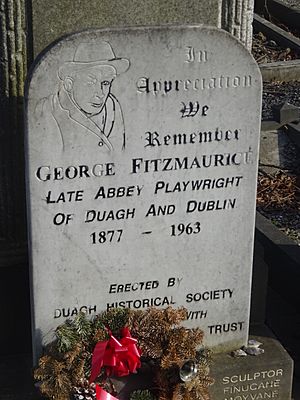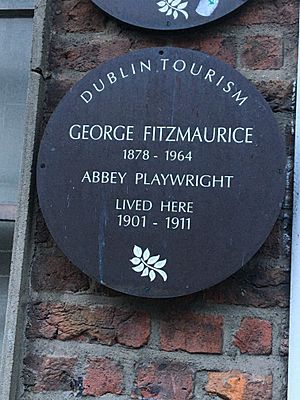George Fitzmaurice (writer) facts for kids
Quick facts for kids
George Fitzmaurice
|
|
|---|---|

Fitzmaurice tombstone, Mount Jerome Cemetery
|
|
| Born | 28 January 1877 Bedford House, Listowel, County Kerry, Ireland |
| Died | 12 May 1963 (aged 86) 3 Harcourt Street, Dublin |
| Resting place | Mount Jerome Cemetery |
| Occupation | Playwright |
| Language | English |
| Nationality | Irish |
| Genre | Theatre |
George Fitzmaurice (born 28 January 1877 – died 12 May 1963) was an Irish writer. He wrote plays for the theatre and also short stories. Some of his plays were even played on the radio!
Contents
Early Life and Family
George Fitzmaurice was born in a place called Bedford House in Listowel, County Kerry, Ireland. This was on January 28, 1877. He went to school at Duagh National School and later at St. Michael's College in Listowel.
George grew up in the Protestant faith, like his father. His father was a Protestant clergyman in Listowel. When George was 14, his father passed away, and his family lost a lot of their money.
George had eleven brothers and sisters. His parents had different religions. George and his brothers were raised as Protestants. His sisters were raised as Roman Catholics. Sadly, none of George or his siblings ever got married or had children. He was the last Fitzmaurice from Duagh.
After his father died, George moved to Dublin. He got a job as a clerk for a government board. In 1916, he joined the British Army. After the war, he came back to Dublin. He found it hard to be around crowds of people. He then worked for the Land Commission, another government office.
A Career in Theatre
George Fitzmaurice became a successful playwright. His first big play was a comedy called The Country Dressmaker. It was shown at the famous Abbey Theatre in 1907. People especially loved a character named Luke Quilter, "The man from the mountain." Even the famous writer W.B. Yeats was surprised by how popular he was! This play also helped the Abbey Theatre earn much-needed money.
Fitzmaurice wrote another play called The Pie Dish. However, critics did not like it at all. They thought it was disrespectful. Because of this, another one of his plays, The Dandy Dolls, was not put on stage for a long time. Today, people think The Dandy Dolls is one of his best plays. It was finally performed at the Abbey Theatre in 1969, six years after George died.
During his lifetime, some of Fitzmaurice's plays were broadcast on Radio Éireann Players. A poet named Austin Clarke also produced some of his plays at the Lyric Theatre in Dublin. In 1923, his play Twixt by Giltinans and the Carmodys was also performed at the Abbey Theatre. Eight more of his plays were printed in a literary magazine called The Dublin Magazine between 1924 and 1925.
Later Life and Legacy
After fighting in World War I, George Fitzmaurice became very shy. He avoided traveling and being around people or crowds. He spent his later years doing the same things every day in Dublin.
In 1963, George Fitzmaurice passed away at his home in Dublin. He was buried in Mount Jerome Cemetery.
A few years after he died, in 1965, a TV and radio station called RTÉ reported that people were starting to appreciate George Fitzmaurice's plays more. Another playwright from Kerry, John B Keane, said that Fitzmaurice was finally being seen as the great writer he truly was. He admired Fitzmaurice's clear and concise writing style.
George Fitzmaurice did not have many personal items. He kept copies of almost all his published plays and even some plays he had not finished. He did not leave a will when he died.
In his hometown of Duagh, a library was named after him, called The George Fitzmaurice Library. Also, in 1995, a special headstone was placed on his grave. It was made by a local artist and paid for by the Duagh Historical Society.
Selected Works
Plays
Fitzmaurice's plays often showed real-life situations mixed with the unique way Irish people spoke at that time.
- The Pie-Dish, 1908
- The Moonlighter, 1912
- The Dandy Dolls (written 1911, published 1914, first staged in 1945)
- The Country Dressmaker, 1914
- ’Twixt the Giltinans and the Carmodys, 1923.
Fiction
- The Magic Glasses (1913)
 | Kyle Baker |
 | Joseph Yoakum |
 | Laura Wheeler Waring |
 | Henry Ossawa Tanner |



